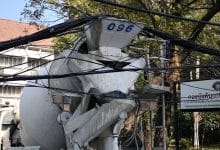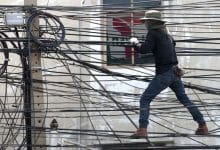Mekong power play sparks concerns: Dam contract makes waves

Conservationists and residents of the Mekong Basin are urging the Thai government to reconsider signing a contract to purchase electricity from the Pak Beng Hydropower Dam in Laos, citing potential economic and territorial losses.
An open letter addressed to Prime Minister Srettha Thavisin and Energy Minister Pirapan Salirathavibhaga captured the concerns, with signatures from Thongsuk Inthawong, former headman of Bann Huai Luek in Wiang Kaen district, Chiang Rai; Niwat Roikaew, the head of the local conservation group Rak Chiang Khong; and the Network of Thai Mekong People, a civil group active in eight provinces along the Mekong Basin.
During the prime minister’s visit to Chiang Rai yesterday, the letter was handed over to the government. Srettha was slated to visit Chiang Saen district on the Mekong River bank and receive a briefing on irrigation improvements aimed at bolstering water availability.
The letter references a meeting of the Mekong River Commission that acknowledged progress on the Pak Beng hydropower dam project, which is set to be constructed on the Mekong River in Oudomxai province, Laos, about 70 kilometres from the Thai–Laos border in Wiang Kaen district, Chiang Rai.
Expected to generate 920 megawatts of electricity, the dam plans to sell 95% of its output to the Electricity Generating Authority of Thailand (Egat). Cross-border impacts are currently under study, with results to be presented to Egat before financial commitments are made.
Four forums have been conducted to inform local populations about the Pak Beng project, where residents expressed concerns about potential threats from the dam. The primary worry revolves around water backing up from the dam, potentially flooding homes and farmland in Wiang Kaen, Chiang Khong, and Chiang Saen districts.
Local fishery
Additional concerns include the dam’s potential to disrupt fish migration in the Mekong River, adversely affecting the local fishery industry. Alterations in water levels could also jeopardise the farming and cultivation of freshwater seaweed, a valuable cash crop for farmers in these districts.
The letter stated…
“We can’t call the project a clean energy project because it is bound to come at the expense of livelihoods, economic well-being, and the culture of people living along the Mekong River.”
The letter emphasises that water released by the dam could overflow islets in Thai territory, posing a risk of territorial loss. It also criticises the urgency and the quality of the dam project, noting that the environmental study supporting the project relied on outdated information, resulting in a substandard impact assessment.
Residents were reportedly not informed about the extent of water overflow and the consequent damage to their livelihoods and farming operations. They were left unaware of how high the water would rise and the potential impacts on their daily lives and agricultural activities.
The letter also argues that purchasing electricity from the dam is unnecessary, given the country’s ample power reserves, reported Bangkok Post.
Latest Thailand News
Follow The Thaiger on Google News:


























